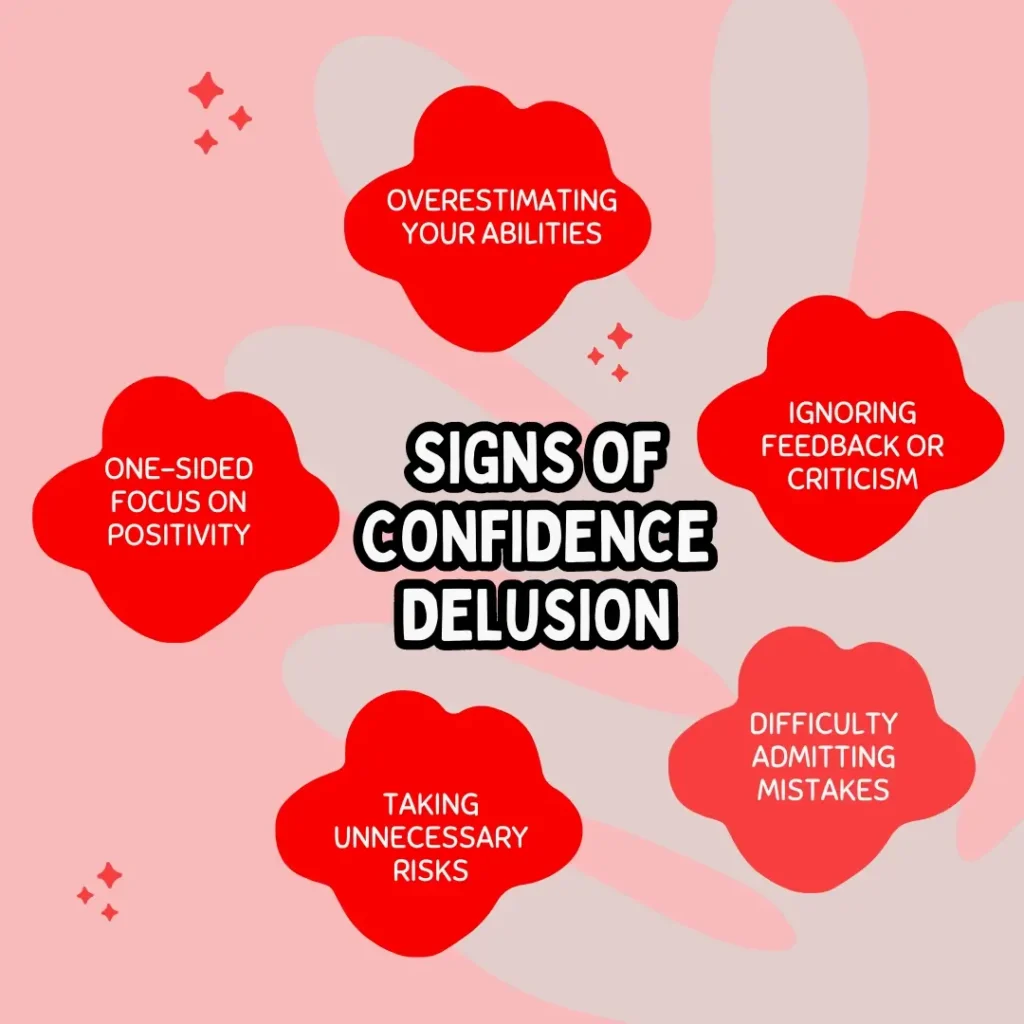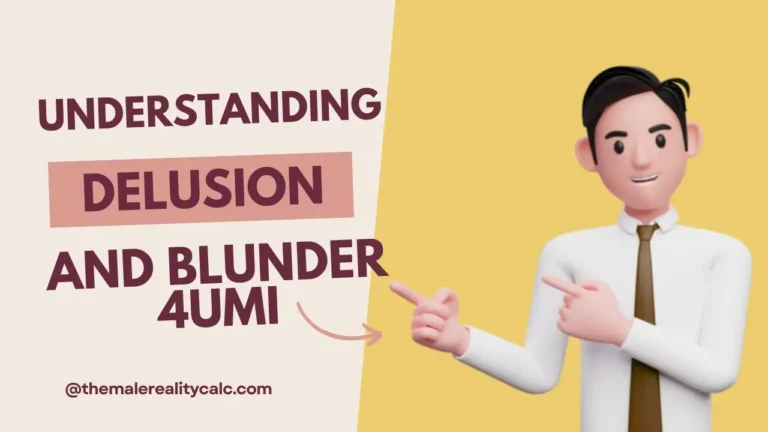What Gave You the Confidence Delusion? Real vs. Illusory Confidence.

What Gave You the Confidence Delusion? Confidence is a powerful quality that can help us achieve our goals and overcome obstacles. It gives us the courage to take risks, step out of our comfort zone, and pursue our dreams with determination and resilience. However, confidence can sometimes be mistaken for delusion, which can lead to poor decision-making, a lack of accountability, and even risky behavior.
In this guide, we’ll explore the difference between confidence and delusion, the signs of confidence delusion, and how to develop genuine confidence based on self-awareness. This post offers insights and practical tips to help you succeed in personal and professional endeavors.
What is Confidence?
Confidence is a belief in yourself and your abilities. It’s the assurance that you’re capable, worthy, and competent when facing challenges and achieving goals. You don’t have to be arrogant or over-confident to be confident. Instead, it’s a quiet self-assurance that comes from understanding your strengths and weaknesses.
You can also read more about the Who Is More Loyal Male Or Female In A Relationship?
When you have confidence, you’re able to trust your judgment and decisions, even in the face of uncertainty or adversity. This allows you to take risks, step out of your comfort zone, and pursue your dreams with determination and resilience.
Confidence is a quality that can be developed through practice, positive thinking, and self-awareness. With confidence, you’re better equipped to handle setbacks, overcome obstacles, and succeed in both personal and professional endeavors. Confidence is the cornerstone of self-esteem and plays a crucial role in shaping your mindset and attitude towards life.
What is Delusion?
If you experience delusions, it means you hold onto a belief that goes against strong evidence. You might misinterpret reality and have a hard time accepting factual contradiction. Delusions can take different forms, ranging from grandiose claims to paranoia. Often, they’re associated with mental health conditions, such as schizophrenia, or can arise from substance misuse or trauma.
You can also read more about the Stages of Delusion
Delusions can disrupt your life, hinder your daily functioning, and even lead to risky actions. The good news is that treatment is available. It involves therapy and medication, which can help you understand and cope with your symptoms. Reach out to a healthcare professional for support.
Understanding Confidence vs. Delusion
Confidence and delusion are often mistaken for each other, but they are two distinct concepts. Confidence means believing in yourself and your abilities without being arrogant. It helps you trust your decisions and take risks, leading to personal and professional success.
You can also read more about the What is man delusion?
It’s built through practice and self-awareness. Delusion, however, is holding onto beliefs that don’t match reality, often linked to mental health issues. Treatment involves therapy and medication.
| Aspect | Confidence | Delusion |
| Definition | Belief in oneself and abilities, quiet self-assurance | Belief contrary to evidence, misinterpretation of reality |
| Behavior | Trusting judgment and decisions, taking risks | Disruptive behavior, risky actions |
| Development | Developed through practice, positive thinking, self-awareness | Associated with mental health conditions, substance misuse, trauma |
| Impact | Enhances resilience, promotes personal, professional success | Hinders daily functioning, requires treatment |
| Treatment | Not applicable | Therapy, medication |
| Recommendation | Encourage practice, self-awareness | Seek healthcare professional support |
Signs You Might Have the Confidence Delusion
The following are some of the most common signs of confidence delusion:

Overestimating Your Abilities
Suppose you consistently take on tasks or challenges that are beyond your skill level, dismiss constructive criticism or feedback from others, or feel defensive or threatened when your capabilities are questioned. In that case, you might have the delusion of overestimating your abilities.
You may also find yourself avoiding situations where you could fail or be exposed as lacking in competence. It’s important to understand the difference between genuine confidence, which is based on a realistic assessment of your strengths and weaknesses, and overconfidence, which can lead to poor decision-making and a lack of accountability.
Ignoring Feedback or Criticism
It’s important to recognize the signs of falling into the trap of confidence delusion. One key indicator is ignoring feedback or criticism. When you truly believe in your abilities and value your own opinions above all others, you may dismiss any critiques or suggestions from others as irrelevant or unimportant.
This can lead to a lack of personal growth and improvement, as feedback is essential for learning and development. By shutting out constructive criticism, you may stunt your progress and hinder your ability to reach your full potential. Remember that confidence should not equate to arrogance or stubbornness but rather the ability to be self-assured while remaining open to new ideas and perspectives.
You can also read more about the Effects of Male Delusion
Difficulty Admitting Mistakes
If you are having difficulty admitting mistakes, it could be a sign that you are suffering from confidence delusion. Sometimes, people who believe they are confident have trouble acknowledging when they have made errors or misjudgments. You may be reluctant to take responsibility for your mistakes because you fear appearing weak or incompetent.
Instead, you may tend to deflect blame onto others or make excuses for your actions. However, true confidence is not about being perfect or infallible. It’s about having the self-assurance to own up to your shortcomings and learn from them.
By recognizing and accepting your mistakes, you can display genuine confidence and a willingness to grow and improve. If you consistently avoid admitting when you are wrong, it may indicate that your confidence is rooted in delusion rather than reality.
Taking Unnecessary Risks
Those who suffer from confidence delusion may take unnecessary risks. A true sense of confidence entails assessing situations accurately and making informed decisions based on realistic outcomes.
Conversely, those with an inflated sense of confidence may believe they are invincible and can handle any challenge without considering the potential consequences. This can lead to reckless behavior, such as engaging in extreme sports without proper training or taking financial risks without a backup plan.
If you regularly put yourself in danger or make risky decisions without weighing the potential outcomes, it may be a sign that you have fallen victim to the confidence delusion.
One-Sided Focus on Positivity
Signs that someone is experiencing confidence delusion can include a focus solely on positivity. By concentrating exclusively on promoting positive thoughts and ignoring any negative emotions or self-doubt, an individual may be masking their true level of confidence.
True confidence involves acknowledging and accepting one’s positive and negative aspects. If someone constantly avoids or suppresses negative emotions, they may be experiencing a delusion of confidence.
It is important to remember that confidence is not about being positive all the time but rather about being comfortable with oneself and one’s abilities, including both strengths and weaknesses. By only portraying a facade of positivity, individuals may miss out on opportunities for growth, self-improvement, and authentic self-confidence.
How to Build Genuine Confidence
Genuine confidence isn’t a delusion; it’s a belief in yourself built on a strong foundation. Here are some practical steps to cultivate that belief:

You can also read more about the Can A Deaf Person Have Auditory Delusions?
The Risks of the Confidence Delusion
The confidence delusion can be extremely risky and lead to significant consequences. Here is the text formatted into a list:
You can also read more about the Treatment Of Delusion
Ultimately, those who fall victim to the confidence delusion may find themselves isolated, disillusioned, and struggling to regain trust and credibility with others. It is essential to recognize the risks associated with misplaced confidence and strive for a balanced perspective that acknowledges both strengths and limitations.
FAQs About What Gave You the Confidence Delusion?
Can confidence turn into a delusion?
Yes, confidence can cross into delusion when one persistently ignores contrary evidence and feedback. This occurs when self-perception is significantly misaligned with reality, leading to an overestimation of one’s capabilities or influence.
How do I become more confident without being delusional?
Focus on developing skills :
Competencies to build genuine confidence.
Set realistic goals and celebrate small victories.
Reflect on constructive criticism and remain open to learning.
This approach fosters true self-assurance without tipping into delusion.
Is it bad to be a little delusional sometimes?
A slight disconnect from reality can sometimes be protective, fostering resilience against setbacks. However, it’s crucial to maintain a balance and ensure these beliefs don’t lead to negative consequences or hinder personal growth.
What if I need to figure out if my confidence is real?
If you need more clarification about the authenticity of your confidence, seek feedback from trusted peers or mentors. Evaluate your track record of achievements and challenges you’ve overcome. This can help you distinguish between genuine self-esteem and unfounded confidence.
Conclusion About What Gave You the Confidence Delusion?
In conclusion, confidence is a vital quality that can help us achieve our goals and overcome obstacles in both personal and professional settings. However, it’s important to recognize the difference between genuine confidence and confidence delusion, which can lead to poor decision-making, a lack of accountability, and even risky behavior.
By developing self-awareness, practicing positivity, and remaining open to constructive feedback, we can cultivate authentic confidence and succeed in our endeavors while staying grounded in reality.






